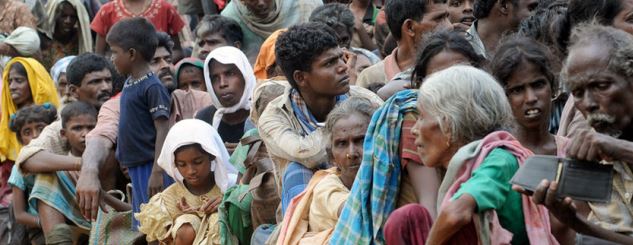Sri Lanka’s Northern Provincial Council (NPC) on Tuesday passed a ground-breaking resolution, declaring that the successive Sri Lankan governments have carried out a systematic campaign of genocide against the Tamil nation in the island. The resolution has also urged the UN investigators to refer the matter to the International Criminal Court (ICC).
“This resolution provides an overview of the evidence demonstrating successive Sri Lankan governments’ genocide against Tamils, and respectfully requests the ongoing United Nations Office of the High Commissioner for Human Rights Investigation on Sri Lanka (OISL) to investigate the claim of genocide and recommend appropriate investigations and prosecutions by the International Criminal Court,” the resolution said.
Stating that the obligation to prevent and punish genocide under the Genocide Convention “is not a matter of political choice or calculation, but one of binding customary international law”, the Council urged “OISL to comprehensively investigate and report on the charge of genocide in its 11 submission to the UN Human Rights Council in March 2015″.
“The UN Security Council should refer the situation in Sri Lanka to the International Criminal Court for prosecutions based on war crimes, crimes against humanity, and genocide. Alternatively or concurrently, domestic courts in countries that may exercise universal jurisdiction over the alleged events and perpetrators, including but not limited to the United States, should prosecute these crimes,” the Council resolved.
The resolution proposed by council member of the Tamil National Alliance (TNA) K Sivajilingam and tabled by Chief Minister C.V. Wigneswaran was passed at the 24th session of the maiden council in the north, with absolute majority with only a couple of members voting against it. Surprisingly, Eelam People’s Democratic Party (EPDP) which has been accused of running a paramilitary group to carry out the dirty work of the government troops, has also supported the resolution.
This happened only after the reference to the EPDP in the resolution was edited out.
Tabling the motion, Chief Minister retired Supreme Court Judge Wigneswaran said “this historically important resolution” will help the Tamils take forward their struggle effectively and internationally.
“It is my hope that this Resolution would not be considered as an epistle to the International Community only, unrelated to the life of my Sinhalese brothers and sisters. This Resolution is a challenge to your moral integrity and humaneness”.
“If you could assimilate what brutality and inconsiderateness has preceded you or bypassed you so far, may be chances for moral regeneration and a more healthier cooperative and coordinated life style for the future of all people living in this blessed Isle could be ensured,” he said in his address at the council.
The resolution said although the OISL investigation is a time-bound effort focused on February 2002 – November 2011, Sri Lanka’s genocide against Tamils began with the island’s independence.
“Since then, Tamils across Sri Lanka, particularly in the historical Tamil homeland of the NorthEast, have been subject to gross and systematic human rights violations, culminating in the mass atrocities committed in 2009. Sri Lanka’s historic violations include over 60 years of statesponsored anti-Tamil pogroms, massacres, sexual violence, and acts of cultural and linguistic destruction perpetrated by the state,” it said.
“These atrocities have been perpetrated with the intent to destroy the Tamil people, and therefore constitute genocide”.
The resolution has come at a time the Sri Lankan government and its international friends and partners are pushing to defer the releasing of the UN-led war crime probe report at the 28th Session of the UNHRC in March in Geneva, in the name of giving “time and space” for the newly-elected government of President Maithripala Sirisena and Prime Minister Ranil Wickremesinghe.
The resolution also made reference to the Rome-based Permanent People’s Tribunal (PPT), which in December 2013, found “Sri Lanka guilty of the crime of genocide against the Eelam Tamil people; the UK and USA were found to be guilty of complicity, while the Judges withheld their decision on India’s complicity pending examination of further evidence”.
The NPC resolution said that the evidence related to the “escalation of militarisation, colonisation and forcible imposition of Sinhala Buddhist culture” in Tamil areas contributed to a finding of genocide by the PPT on Sri Lanka, an independent, international organization that has examined human rights violations around the world.
This resolution was originally brought in last year but was deferred by some members of the TNA, citing that it could harm the UN-led investigation.
NPC Resolution on Tamil Genocide
– Colombo Mirror
